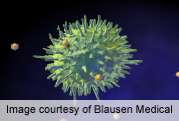Onset of puberty is significantly delayed in perinatally HIV-infected children compared with those who are HIV-exposed but uninfected, but combination antiretroviral therapy may result in more normal timing of pubertal onset, according to research published in the July 31 issue of AIDS.
(HealthDay)—Onset of puberty is significantly delayed in perinatally HIV-infected (PHIV) children compared with those who are HIV-exposed but uninfected (HEU), but combination antiretroviral therapy may result in more normal timing of pubertal onset, according to research published in the July 31 issue of AIDS.
Paige L. Williams, Ph.D., of the Harvard School of Public Health in Boston, and colleagues analyzed data collected from 2000 to 2012 in two U.S. longitudinal cohort studies (IMPAACT 219C and PHACS AMP) to compare the timing of pubertal onset among PHIV children versus HEU children and to assess the association of disease severity and antiretroviral treatment with pubertal onset.
The researchers found that, for the 2,086 PHIV children, mean age at onset of puberty was significantly delayed compared with HEU children, according to Tanner staging of female breast (10.3 versus 9.6 years), female pubic hair (10.5 versus 10.0 years), male genitalia (11.3 versus 10.4 years), and male pubic hair (11.5 versus 10.7 years). Significantly greater delay in pubertal onset (four to 13 months) was associated with increased severity of disease (HIV-1 RNA viral load >10,000 copies/mL or CD4% <15 percent). Longer duration of combination antiretroviral treatment correlated with earlier timing of pubertal onset, but this association did not persist after adjustment for birth cohort.
"Pubertal onset occurs significantly later in PHIV than in HEU youth, especially among those with more severe HIV disease," the authors write. "However, in the current era, combination antiretroviral treatment may result in more normal timing of pubertal onset."
More information:
Abstract
Full Text (subscription or payment may be required)
Journal information: AIDS
Copyright © 2013 HealthDay. All rights reserved.


















